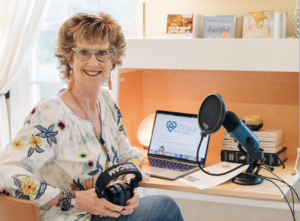 by Jackie Maruska
by Jackie Maruska
My inaugural address on publicity in the music and entertainment industry marked an electrifying moment. Though a veteran, this was my maiden voyage speaking publicly on the subject. I was thrilled and prepared, my expertise ready to shine. After my talk, I received a round of applause and a line of people waiting to ask questions.
Everyone’s a Critic
I wasn’t expecting what happened next. A woman I respected pulled me aside to offer me advice for my next speech. Not only did she pick apart my talk, she also questioned my judgment regarding the stories I’d shared about my professional wins.
She even critiqued my basic black, completely professional, new Anne Taylor suit I’d invested in just for the occasion.
The final blow was one I’ll never forget. She said, “I don’t know what makes you think you can speak on this topic. I mean, you’re barely a seven-year publicist.”
I Couldn’t Get Past It
Her relentless criticism shattered my confidence, overshadowing any positive praise. The echoes of her words haunted me, affecting my every teaching or speaking opportunity. I internalized her judgment, questioning my worth and dismissing the importance of my voice. Despite her lack of expertise in my field, her negative evaluation paralyzed me, leading to missed opportunities and a damaging blow to my self-worth.
What is Imposter Syndrome?
It’s the feeling of being a fraud and fearing the world will discover. Imposter syndrome isn’t about a particular situation; it’s about feeling more inadequate than others in the same situation. This results in a feeling that we don’t belong even if the evidence is to the contrary.
In my life, imposter syndrome made me question everything from what I wore to what I volunteered for, and what promotions I applied for. I used to have a bold God-given certainty that was humble, fearless, and never questioned who I was called to be or do.
Her words shattered that. But I let them.
Even my spiritual joy, my “shine” in my walk with Jesus, was impacted. I started questioning how and where I shared the gospel, inadvertently letting self-doubt infiltrate this aspect of my life. The turning point occurred on a bustling red carpet
surrounded by celebrities with diverse beliefs.
It hit me like lightning—this was the moment to cast off the doubts and let my light shine.
“For if you remain silent at this time, relief and deliverance for the Jews will arise from another place, but you and your father’s family will perish. And who knows but that you have come to your royal position for such a time as this?” (Esther 4:14).
Never before had these verses struck me as clearly as they did in that moment, and that’s all it took for me to step into WHO I was called to be in Christ.
That day I became myself again. I humbly spoke kindness to many who did not know Jesus. Many asked to hear more.
I can’t say whether I led anyone to Jesus on that red carpet, but I do know seeds were planted as I pointed to Him as my Light.
Since my confidence came back, I love guiding others to find their way out of the dreaded imposter syndrome. If the cat’s got your tongue and you’ve lost your ability to shine, here are a few tips that will help.
Seven tips for dealing with imposter syndrome
1. Understand the voice. Assess the evidence: create a two-column list, “Inadequacy” vs. “Competence,” to help you acknowledge the proof of your competency.
2. Refocus on values. Reevaluate what truly matters as you set goals around that.
3. Get out of your head. Stop allowing your thoughts to circle. Find someone to talk to, or write down your fears so you can conquer them.
4. Practice self-compassion. Don’t beat yourself up for feeling like a fraud. Now that you understand where the doubt comes from, credit yourself for how far you’ve come.
5. Keep failure in perspective. Take time to write down likely outcomes if some of your effort fails. Learn from your failures; don’t let them define you.
6. Seek trusted feedback from your network. Make a practice of periodically getting meaningful feedback from people you trust and respect.
7. Stay in the Word. Verses you study will come back to you when you need them.
Continue to pray and ask God to guide you. Be faithful, knowing He may be trying to teach you something bigger than the moment you’re in. I learned it’s NOT all about me, but about Him. Consider what His lesson may be for you and how you can grow from the experience.
New Mexico native Jackie Marushka is a veteran entertainment publicist, entrepreneur, brand builder, mentor, author and speaker. To connect with Jackie, visit marushkamedia.com/contact.



